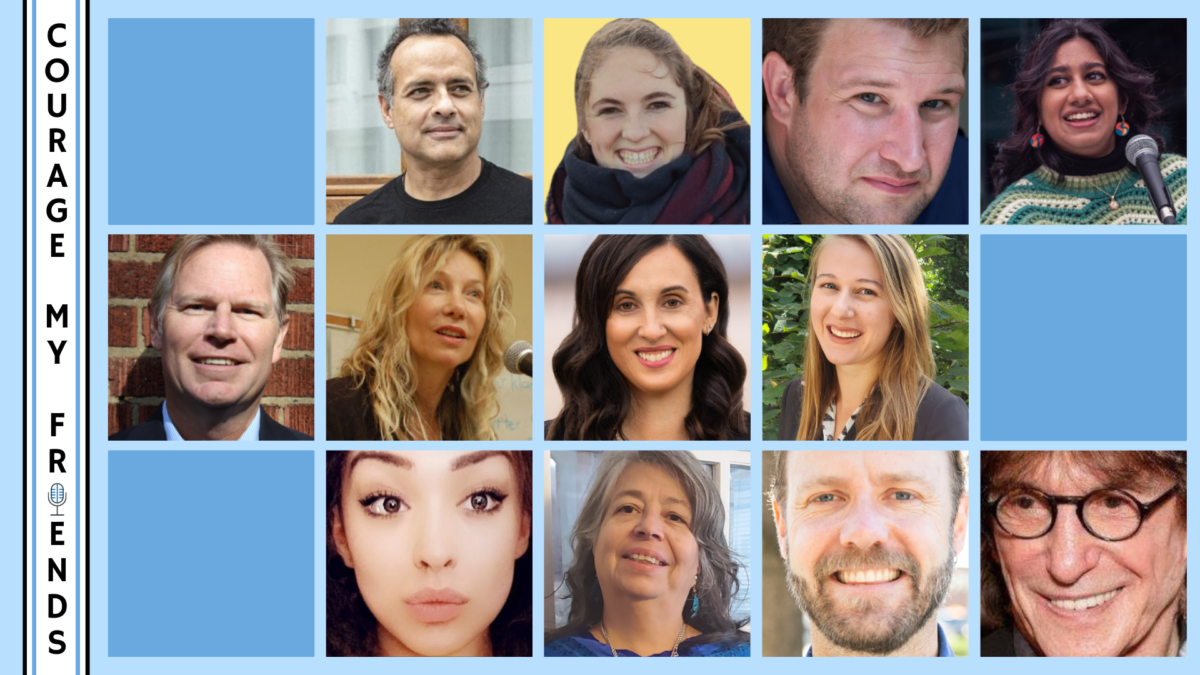After a successful run last year, this summer’s Courage My Friends podcast series returned with a slate of dynamic and in-depth discussions on issues of power and wealth inequality, colonial legacies, the climate crisis, exploitation of labour, land and resources, impacts on frontline populations including on their mental health, and strategies of resistance.
In Education, critical pedagogy and the future of learning in a post-pandemic world, author and public intellectual Henry Giroux launched the series with a focus on education and critical pedagogy as a moral, political and emancipatory resistance to decades of rising authoritarianism. He argued: “To talk about education today, is to really talk about the struggle over agency. The struggle over identity. The struggle over power.”
Amid the multiple crises of this moment, it is still the climate crisis that dominates. There is not a corner of the planet, nor a corner of our lives that is exempt from its impacts. It was therefore fitting that climate became the dominant theme throughout Courage My Friends this summer.
In episode two, Ecological grief: Mourning the past, fearing the future and finding hope, leading voice on climate change and mental health, Ashlee Cunsolo discussed how the damage and disappearance of natural ecosystems is being felt by communities across the world, including Indigenous peoples in Canada’s North and the “era of grief” it is ushering in.
From a UN Refugee Convention that fails to recognize the legitimacy of climate migrants to the ways in which countries, including ours, police borders, the FCJ Refugee Centre’s Loly Rico and Rachel Bryce from the Canadian Association of Refugee Lawyers focused on Conflict, climate and refugees: Borderless crises in a bordered world and the politics of asylum and how this moment is testing our moral and legal obligations to those fleeing crises – and in many cases, crises that we have had a hand in creating.
We returned to the subject of mental health, this time in the workplace, in episode four, Mental health and wellness in the workplace: Are we working well? From harassment and precarity, to the ways that stress and burnout are built into workplace culture in Canada, Jon Weier and Tom Parkin discussed the growing health crisis facing workers and the Douglas Coldwell Layton Foundation’s upcoming report on Mental Health and Wellness in the Workplace.
Episode five took us across borders and beyond the narrow confines of Western discourse to spotlight the planet’s majority in COVID, capitalism, climate: The standard of double-standards between the global north and the global south. Executive director of Tri-Continental Institute for Social Research, Vijay Prashad discusses how the Global South contends with deadly legacies of colonization and Western hegemony through the raft of current crises, including COVID: “…once the West crossed the [vaccine] threshold of 70%. What does it matter now if people are going to die in large numbers elsewhere? That’s the attitude. And that’s an extremely disturbing attitude.”
In episode six, COVID, inequality and the billionaire space-race, journalist and activist Linda McQuaig and Oxfam Canada’s Ian Thomson continued on the theme of disparity with the extraordinary increase to the already extraordinary wealth and power of the super-rich especially during this pandemic, and what this means for the non-billionaire majority and the democracies meant to protect them.
We closed the summer series with a two-part focus on Climate anxiety and climate justice organizing: Fearing the future, finding hope and fighting for our planet. In episode seven, originator of the Land Back Movement and member of Indigenous Climate Action, Bryanna Brown discussed her work within climate justice organizing and the critical need for Indigenous leadership. “ One quote that Indigenous Climate Action uses that I really like is,” Colonialism caused climate change; Indigenous Rights are the solution.’”
In part two, climate justice activist Aliya Hirji and National Chairperson of the Canadian Federation of Students, Marie Dolcetti-Koros concluded the podcast with a focus on younger generations; their experience of the climate crisis, their anxieties and hopes for the future and the vital role they play in fighting for a truly just and sustainable world.
And as we bring this summer’s series to a close, we are confronted by yet another wave of COVID, a fourth dose – and new global health emergency with the advent of monkeypox, even as ERs struggle to stay open. Conflicts continue to rage across the world, some deemed more newsworthy than others, but all equally intensive and costly to lives and lands. More of us are worrying about climbing food and gas prices amid declining employment numbers and diminishing social security. And as those at the very top continue to retreat into billionaire bubbles of extreme wealth and privilege, and populations from Sri Lanka to the UK witness political upheaval, while an unremitting climate crisis continues to consume a planet that always seems to have other priorities.
However, in the words of the great Tommy Douglas: Courage my friends; ‘tis not too late to build a better world.
There is still much to discuss and still much to hope for.
After a successful second season, we are pleased to announce that Courage My Friends will be returning on a more regular basis to rabble’s Needs No Introduction podcast in the fall.
In the meantime, please check out this season’s episodes, and let us know who you’d like to hear on our next installment of the show. Once again, thanks for listening.
See you in September!
Courage My Friends is presented by The Tommy Douglas Institute and rabble.ca, with the support of the Douglas Coldwell Layton Foundation.



